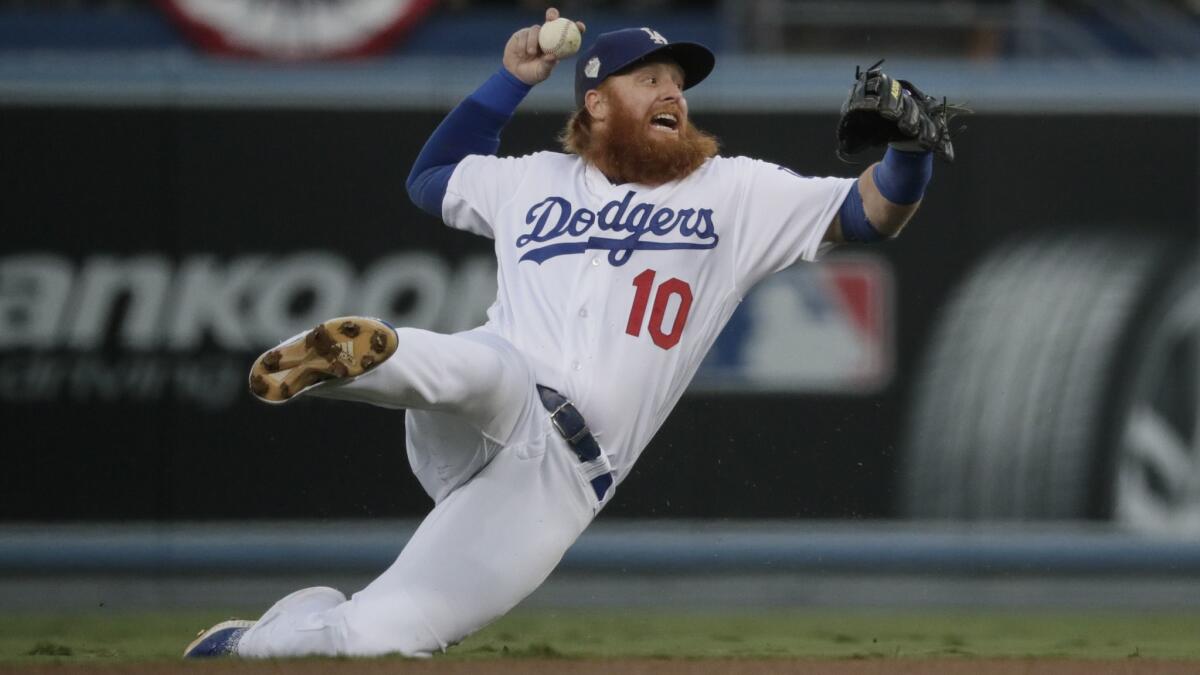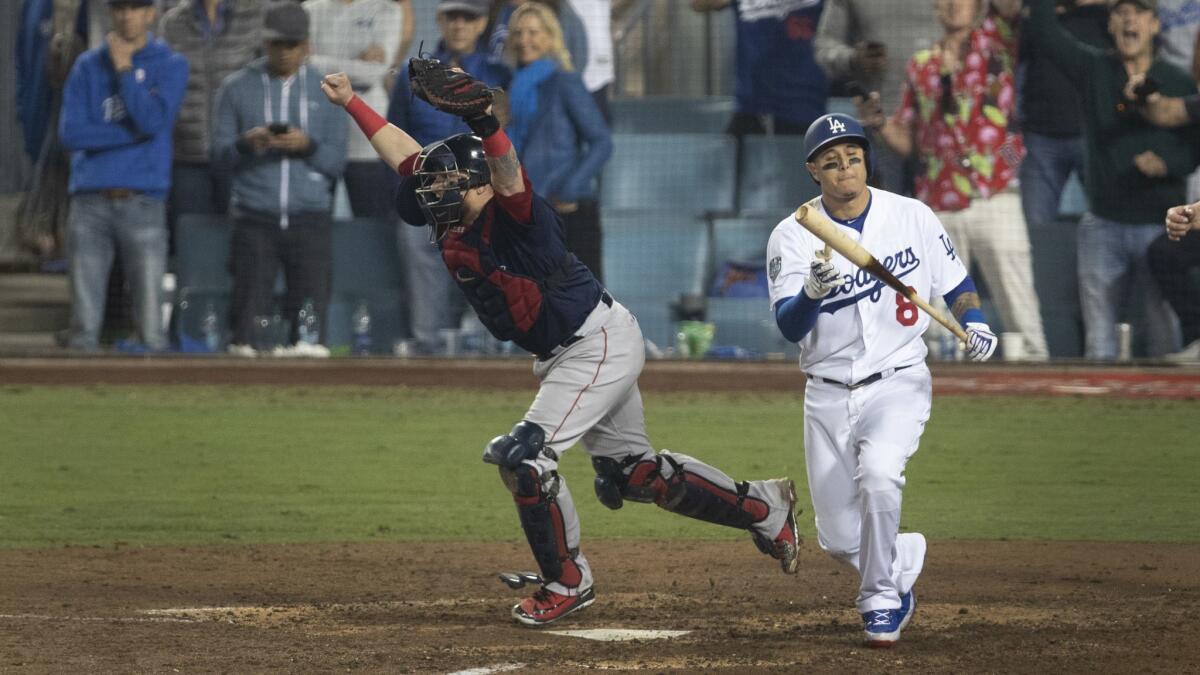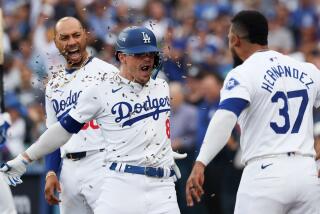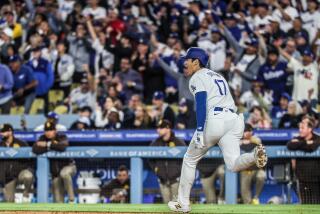Justin Turner feeling ‘psychotic’ after Dodgers’ back-to-back World Series losses

- Share via
Reporting from phoenix — Two days after Manny Machado waved the final, feeble swing of the 2018 World Series, Justin Turner pointed his car toward Dodger Stadium. He lives in Los Angeles during the offseason, so the drive was not far, and the idea of wallowing disgusted him. So he met with the strength and conditioning staff to yet again plot the path toward a championship for 2019, aiming for a summit the Dodgers have not scaled in 31 seasons.
“You can’t just go back and sit at home and not do anything,” the third baseman said. “That’s not it. That’s not the answer. You have to keep going.”
At 34, as the longest-tenured position player on the Dodgers, Turner rarely feels rattled. Little in the sport fazes him. He has been demoted and he has been released. He has ridden benches and he has flown private jets to the All-Star game. Baseball has broken his bones and it has made him rich.
Yet, as he pondered the last two seasons, when the Dodgers won consecutive National League pennants for the first time since 1977-78, Turner struggled to maintain perspective. He could recognize portions of the achievement. In 2017, the group won more games than any other Dodgers team since the arrival in Los Angeles. A year later, the team overcame a pitiable start and a lackluster summer to return to the Series.
Except . . .
“When you get that close two years in a row, it borderline drives you insane,” Turner said. “You’re just psychotic about trying to finish it. So the drive is even greater than it was last year.”
As the full squad reports to camp Monday, the Dodgers loom as the overwhelming favorites to collect a seventh consecutive NL West title. The projection system for Baseball Prospectus tabbed the Dodgers as a 93-win club, the best in the league, with a nine-win gap separating them from the rest of the division.
The first week at Camelback Ranch was serene as pitchers and catchers arrived. Clayton Kershaw sported a trimmer physique. Kenley Jansen vowed to actually appear in Cactus League games. Joe Kelly threw a bullpen session clad in a T-shirt with a cat on it. Manager Dave Roberts counseled the veteran hitters not to exhaust themselves.
“For me, there’s no rush,” Roberts said. “I actually try to deter guys from showing up early. It’s a long season.”
Percolating beneath the calm, Turner suggested, is the strange blend of accomplishment and bitterness that greets every silver medalist. For two years in a row, the Dodgers ended their season watching another team dogpile in the center of Dodger Stadium. They shuffled to the elevators on the ground floor of the ballpark while their opponents sprayed champagne nearby.
So all the victories in 2017 ring hollow, Turner said. Same with the sense of pride generated by overcoming injuries and ineffectiveness in 2018.
“That’s the hard part — staying positive about how good of a year we had the last two years,” Turner said. “Because the perception is ‘We lost the World Series twice, so it was a [bad] year.’ But at the same time, we lost the World Series. So it wasn’t a failure.”
Both defeats sting. But the magnitude differs, Turner said. In 2017, the Dodgers wilted in Game 7 after fumbling chances against the Houston Astros. A year later, the Boston Red Sox pounded them in five games, most of which weren’t particularly close.

“The Red Sox were unbelievable,” Turner said. “They were a really, really, really, really good team. And you know what? They were hot. They were ridiculous. I don’t think it’s easy, but it’s almost easier to be like ‘Wow, we ran into a buzzsaw.’
“The year before, losing Game 7, when it was right there, that one was a tougher loss.”
The hangover from 2017 extended into 2018. The season was far from pleasant. Turner sat out 40 games because of a broken wrist suffered in late March. The Dodgers opened with a 16-26 record. They were 4 1/2 games back Aug. 22 and in third place Aug. 30.
With the team scrambling, the lineup became a platoon-based blur. Cody Bellinger, Yasiel Puig and Joc Pederson often sat against left-handed pitchers. David Freese, Matt Kemp and Enrique Hernandez rode the bench against right-handed pitchers. The tumult left players grumbling.
Turner understood the frustration of his teammates. As one of the few players starting every day, he tried to communicate with the younger hitters. This strategy was a necessity, he told them. The collective could not afford to let individuals fail.
“There was all this noise about the platoons,” Turner said. “We won the division. We went to the World Series. You can’t say that it didn’t work. Because we lost in the World Series, people were saying ‘Oh, it’s because you platooned.’ What? How did we get there?
“That was our identity last year. That’s not an organizational philosophy. It’s just what we had to do to adapt to survive.”
Turner understands the value in avoiding stasis. He has reshaped his swing since joining the Dodgers in 2014 and become one of the most valuable players in the sport. Since 2016, only 13 hitters have been worth more wins above replacement than Turner, according to FanGraphs.
On the elite rosters of the Dodgers, he still stands out. Turner led the team in batting average (.312) in 2018. He posted the best on-base-plus-slugging percentage in 2017 (.945). He tied for the most home runs in 2016 (27). He has done so while avoiding the pitfalls of decline that are common for players his age.
“In today’s terminology, I guess I’m considered ‘an outlier,’ ” Turner said. “Whatever the [heck] that means.”
Turner shrugged off the suggestion that the team could waltz to another NL West title. He pointed to last season, when the sizable gap in talent between the Dodgers and the rest of the division meant little. The team still required 163 games to hold off the Colorado Rockies.
And they still have their sights set beyond the regular season.
“We’ve won the division six years in a row,” Turner said. “There’s a target on our back. Teams are going to want to kick our [backside]. That’s the way it is.
“Do we believe we’re a good team? Absolutely. Every guy in here, to a man, thinks we’re a really, really good team, and have a chance to do something special.
“At the same time, that doesn’t count for a run. You don’t score runs because you’re supposed to be good. You still have to figure out ways to score runs and throw strikes and play defense. That’s what we have to do.”
Sign up for our Dodgers newsletter »
Twitter: @McCulloughTimes
More to Read
Are you a true-blue fan?
Get our Dodgers Dugout newsletter for insights, news and much more.
You may occasionally receive promotional content from the Los Angeles Times.










